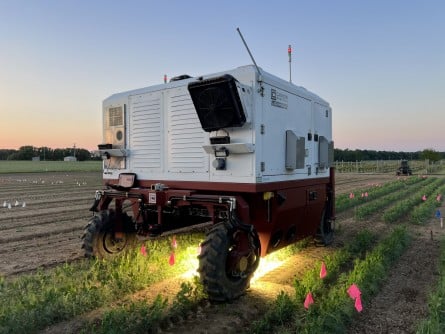A groundbreaking approach to weed management is taking shape in New Jersey, where a team of researchers from Rutgers University is testing a laser weeder that aims to eliminate unwanted plants without chemicals. Led by Thierry Besançon, an associate professor in the Department of Plant Biology, the project employs artificial intelligence and laser technology to distinguish between crops and weeds, delivering a precise solution to a persistent agricultural challenge.
The recent field trials represent the first peer-reviewed study of artificial intelligence-guided laser weeding on the East Coast, with findings published in the journal Pest Management Science. Results indicate that the laser weeder performs comparably to traditional herbicides in controlling weeds, and in some cases, facilitates even better crop growth. “It’s pure physics,” Besançon stated, noting that the technology relies solely on light energy to target weeds, eliminating the need for herbicides.
Field Trials and Promising Results
The trials, conducted in the spring and summer of 2024, involved a demonstration unit provided by Carbon Robotics, a company at the forefront of this technology. Equipped with high-resolution cameras and deep learning algorithms, the machine can identify crops and weeds in real time and use pinpoint laser beams to destroy the unwanted plants. Besançon collaborated with Dr. Lynn Sosnoskie, an assistant professor at Cornell University, in conducting the research at the Rutgers Agricultural Research and Extension Center in Upper Deerfield.
The laser weeder was tested on a variety of crops, including spinach, peas, and beets. The significance of these trials extends beyond academic interest; they address the specific needs of New Jersey’s agricultural landscape, where small farms often cultivate specialty crops with limited herbicide options. The Vegetable Growers Association of New Jersey and the Rutgers New Jersey Agricultural Experiment Station supported the research, underscoring its relevance to local growers.
In an editorial accompanying the published study, Stephen O. Duke, a distinguished weed scientist at the University of Mississippi, described the research as “potentially transformative.” He likened the innovation to the introduction of glyphosate-resistant crops, which revolutionized weed control strategies over the past few decades. Duke praised the Rutgers-Cornell study for providing “convincing evidence” that AI-guided laser technology could reshape weed management practices.
Precision and Challenges Ahead
The laser weeder operates with remarkable accuracy, as Besançon explained, “We had weeds growing just half a centimeter from the crop seedlings, and there was no laser damage to the crops.” Despite its precision, the machine does come with challenges. Its high cost—starting at around $500,000—may limit accessibility for many farmers. Additionally, the technology is best suited for short-season crops and requires multiple passes throughout the growing season, especially in New Jersey’s wetter climate, where weed growth is more frequent.
Monitoring fields closely is essential, as larger weeds demand more energy from the laser, potentially slowing down operations. “You can’t wait too long,” Besançon cautioned. Yet, he remains optimistic about technological advancements that could lead to faster and more efficient versions of the machine in the future.
The laser weeder presents significant environmental benefits by reducing reliance on chemical herbicides. This is particularly important in the context of rising herbicide-resistant weed populations, such as Palmer amaranth, which poses a growing threat to crops in New Jersey and beyond. “We are using photons for weed control,” Besançon said, emphasizing that this innovation offers a new perspective on weed management.
As the technology evolves, it holds the potential to transform practices for organic and specialty crop growers. Besançon noted that interest is already building among farmers, with one New Jersey grower expressing enthusiasm for purchasing a commercial laser weeder after seeing the results of the field trials. “He told me, ‘I don’t have any other options,’” Besançon recalled, highlighting the pressing need for effective solutions.
The integration of AI-guided machines in weed management is gaining traction, particularly among West Coast farmers seeking eco-friendly alternatives to herbicides. Looking ahead, Besançon envisions a future where laser weeders become integral to sustainable farming practices, contributing to a healthier food supply. “It’s exciting, and it’s just the beginning,” he concluded, reflecting on the unexpected journey into laser technology in agriculture.







